If you’re a cat owner who has witnessed the perplexing phenomenon of your furry companion throwing up food but acting completely normal otherwise, you’re not alone.
It’s a puzzling scenario that often leaves pet owners wondering what could be going on inside their feline friend’s stomach and whether there’s cause for concern.
In this article, we will explore the reasons behind why cats may vomit their food but continue to display their usual behaviors and mannerisms.
So, let’s embark on this investigative journey to understand why your cat may be throwing up food while maintaining a seemingly unaffected demeanor.
What Does It Mean When Your Cat Vomits Food
Vomiting, also called throwing up, is the emptying of a cat’s stomach contents. Cats vomit for many different reasons. Some of the causes of vomiting are relatively benign and may even resolve on their own. Others can be much more serious and require veterinary attention.
Vomiting is different from regurgitation, which is the emptying of the esophagus (the long tube that delivers food to the stomach). Regurgitation happens immediately after the cat swallows food and looks almost effortless.
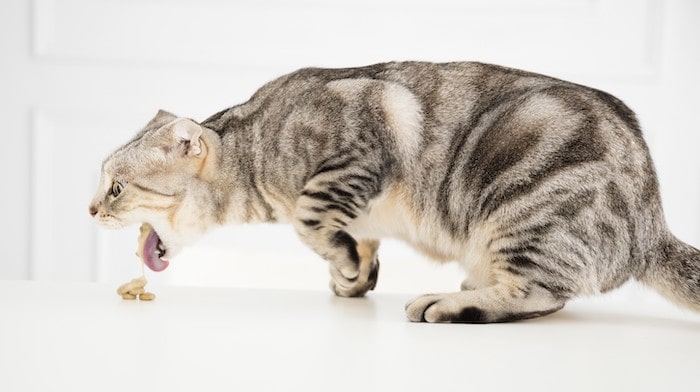
Vomit may or may not contain pieces of partially digested food or even undigested food, while regurgitated food always comes out in one long tube shape that matches the shape of the cat’s esophagus.
Vomiting is also different from hairballs, which are clumps of hair that accumulate in the stomach or intestines and are expelled by coughing. Hairballs are common in cats, especially long-haired breeds, and are usually harmless. However, sometimes they can cause repeated vomiting or even blockages in the digestive tract, which can be life-threatening.
Causes of Cat Vomiting
There are various factors that can cause cats to throw up food, ranging from minor to major issues. Here are the top five reasons for a cat throwing up food but acting normal:
Eating too fast or too much
One of the most common causes of cat vomiting is eating too fast or too much. Cats are notorious for being obsessed with food and sometimes they can gobble down their meals in a matter of seconds. This can cause the food to come back up as regurgitation, which is different from vomiting because it does not involve the stomach or digestive enzymes.
Regurgitation happens when the food does not reach the stomach and instead gets stuck in the esophagus, which is positioned horizontally in cats. The food then expands due to water absorption and triggers a reflex that makes the cat expel it. Regurgitation usually occurs shortly after eating and the food looks undigested.
If your cat eats too fast or too much, you can try to slow them down by using puzzle feeders, dividing their food into smaller portions, or feeding them more frequently. You can also try to switch to wet food, which is easier to digest and has more moisture content. However, if your cat regurgitates frequently or shows signs of weight loss, you should consult your vet to rule out any underlying issues.
Food allergies or intolerances
Another reason why your cat is throwing up food but acting normal may be that they have a food allergy or intolerance. Food allergies are immune system reactions to certain proteins in the food, such as chicken, beef, fish, dairy, or eggs. Food intolerances are digestive system reactions to certain ingredients in the food, such as grains, preservatives, or additives.
Food allergies and intolerances can cause inflammation in the stomach and intestines, leading to vomiting and diarrhea. They can also cause other symptoms, such as skin rashes, itching, hair loss, ear infections, or respiratory problems. Food allergies and intolerances can develop at any age and can be triggered by new foods or foods that your cat has been eating for a long time.
If you suspect that your cat has a food allergy or intolerance, you should contact your vet for diagnosis and treatment. Your vet may perform tests to identify the offending ingredient and prescribe medication to reduce inflammation and discomfort. You may also need to change your cat’s diet to a hypoallergenic or limited ingredient formula that does not contain the allergen or irritant.
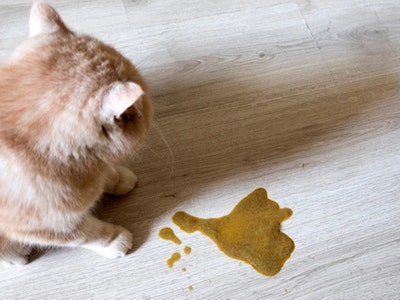
Hairballs or ingestion of foreign objects
Cats are very clean animals and they spend a lot of time grooming themselves with their tongues. However, this also means that they swallow a lot of hair, which can accumulate in their stomachs and form hairballs. Hairballs are clumps of hair mixed with saliva and digestive fluids that can irritate the stomach lining and cause vomiting.
Hairballs are more common in long-haired cats and cats that shed excessively due to stress, seasonal changes, or health problems. Hairballs usually pass through the digestive tract without causing any trouble, but sometimes they can get stuck and cause blockages or infections.
Hairballs can also be accompanied by other foreign objects that your cat may have ingested accidentally or intentionally, such as grass, plants, string, rubber bands, toys, bones, or plastic.
If your cat vomits hairballs occasionally and does not show any other signs of distress, you do not need to worry too much. You can help prevent hairballs by brushing your cat regularly to remove loose hair and mats, giving them hairball remedies or supplements that lubricate the digestive tract, or feeding them hairball control diets that contain fiber and enzymes that break down hair.
However, if your cat vomits hairballs frequently or shows signs of pain, lethargy, loss of appetite, or constipation, you should seek veterinary attention immediately. Your cat may have a serious obstruction or infection that requires surgery or medication.
Eating grass or plants
Cats are carnivores, but they also have a natural instinct to eat grass or plants. There are several theories as to why cats do this, such as to aid digestion, to induce vomiting, to supplement their diet, or to satisfy their curiosity. However, not all plants are safe for cats and some can be toxic or cause allergic reactions.
Some of the common plants that can cause vomiting in cats are lilies, tulips, daffodils, azaleas, oleanders, sago palms, and poinsettias. These plants can also cause other symptoms, such as drooling, mouth irritation, diarrhea, seizures, kidney failure, or death. Other plants that can cause mild vomiting in cats are onions, garlic, chives, grapes, raisins, chocolate, coffee, tea, and alcohol.
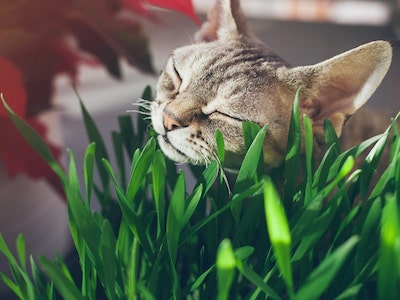
If your cat eats grass or plants occasionally and does not show any signs of distress, you do not need to worry too much. You can provide your cat with safe and cat-friendly plants, such as catnip, cat grass, wheatgrass, or parsley. You can also keep your cat away from toxic or harmful plants by placing them out of reach or spraying them with deterrents.
However, if your cat eats a large amount of grass or plants or shows signs of poisoning, such as drooling, mouth irritation, diarrhea, seizures, kidney failure, or death, you should seek veterinary attention immediately. Your vet may induce vomiting, administer activated charcoal, or provide supportive care depending on the type and amount of plant ingested.
Stress or anxiety
Cats are sensitive creatures and they can get stressed or anxious by various factors in their environment. Some of the common causes of stress or anxiety in cats are changes in routine, household, or territory; new people, pets, or noises; lack of attention or stimulation; separation from owners; illness or pain; or trauma or abuse.
Stress or anxiety can affect your cat’s physical and mental health and cause various behavioral and physiological problems. One of these problems is vomiting due to increased gastric acid secretion and decreased gastric motility. Stress or anxiety can also cause other symptoms in cats such as hiding, aggression, spraying, scratching furniture and walls.
If your cat is throwing up food but acting normal due to stress or anxiety you should try to identify and eliminate the source of stress or anxiety if possible. You should also provide your cat with a calm and comfortable environment where they can feel safe and secure. You can also use pheromone diffusers sprays collars toys treats that can help reduce stress and anxiety in cats.
However if your cat is vomiting frequently or shows signs of depression loss of appetite weight loss lethargy you should consult your vet for diagnosis and treatment. Your vet may prescribe medication supplements behavioral therapy that can help your cat cope with stress and anxiety.
When to Worry About Cat Vomiting
While vomiting is not always a sign of a serious problem in cats it can also be a symptom of more serious conditions that require immediate veterinary attention. Some of these conditions are:
Kidney stones or failure
Kidney stones are hard deposits of minerals and salts that form in the kidneys and can cause pain inflammation infection obstruction in the urinary tract. Kidney failure is a condition where the kidneys lose their ability to filter waste products and toxins from the blood and maintain fluid and electrolyte balance.
Kidney stones and failure can cause vomiting in cats due to increased urea levels in the blood nausea dehydration acidosis. They can also cause other symptoms such as increased thirst urination blood in urine weight loss loss of appetite lethargy bad breath oral ulcers anemia.
Kidney stones and failure are serious conditions that can be fatal if not treated promptly. Your vet may perform tests such as blood urine x-ray ultrasound to diagnose kidney stones and failure and prescribe medication surgery fluid therapy dietary changes that can help treat them.
Pancreatitis or liver disease
Pancreatitis is a condition where the pancreas becomes inflamed due to infection trauma toxins drugs metabolic disorders immune-mediated diseases. Liver disease is a condition where the liver becomes damaged due to infection toxins drugs metabolic disorders immune-mediated diseases cancer.
Pancreatitis and liver disease can cause vomiting in cats due to increased bile acids in the blood nausea inflammation infection obstruction in the digestive tract. They can also cause other symptoms such as decreased appetite weight loss diarrhea jaundice fever abdominal pain swelling ascites.
Pancreatitis and liver disease are serious conditions that can be fatal if not treated promptly. Your vet may perform tests such as blood urine x-ray ultrasound biopsy to diagnose pancreatitis and liver disease and prescribe medication surgery fluid therapy dietary changes that can help treat them.
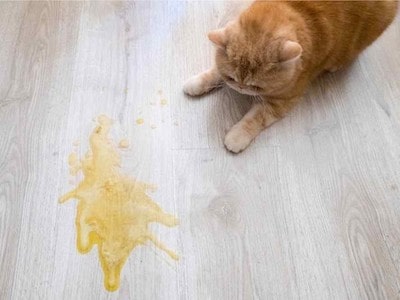
Internal obstructions or blockages
Internal obstructions or blockages are conditions where something gets stuck in the digestive tract and prevents food water gas from passing through normally. This can be caused by hairballs foreign objects tumors parasites inflammation infection.
Internal obstructions or blockages can cause vomiting in cats due to increased pressure nausea pain dehydration acidosis. They can also cause other symptoms such as decreased appetite weight loss diarrhea constipation abdominal distension gasping.
Internal obstructions or blockages are serious conditions that can be fatal if not treated promptly. Your vet may perform tests such as physical examination x-ray ultrasound endoscopy to diagnose internal obstructions or blockages and prescribe medication surgery fluid therapy that can help treat them.
Parasitic infections or poisoning
Parasitic infections are conditions where parasites such as worms protozoa mites fleas ticks infect the cat’s body and cause damage to the organs tissues blood cells. Poisoning is a condition where the cat ingests or comes into contact with a toxic substance such as plants chemicals drugs medications.
Parasitic infections and poisoning can cause vomiting in cats due to irritation inflammation infection toxicity in the digestive tract. They can also cause other symptoms such as diarrhea anemia weight loss itching skin lesions seizures coma.
Parasitic infections and poisoning are serious conditions that can be fatal if not treated promptly. Your vet may perform tests such as fecal blood skin urine to diagnose parasitic infections and poisoning and prescribe medication decontamination antidotes that can help treat them.
Cancer or other chronic diseases
Cancer is a condition where abnormal cells grow and multiply uncontrollably and invade the normal tissues and organs of the body. Other chronic diseases are conditions that last for a long time and affect the normal functioning of the body such as diabetes hyperthyroidism inflammatory bowel disease.
Cancer and other chronic diseases can cause vomiting in cats due to increased pressure nausea pain inflammation infection obstruction in the digestive tract. They can also cause other symptoms such as decreased appetite weight loss diarrhea blood in stool lethargy weakness difficulty breathing.
Cancer and other chronic diseases are serious conditions that can be fatal if not treated promptly. Your vet may perform tests such as blood urine x-ray ultrasound biopsy to diagnose cancer and other chronic diseases and prescribe medication surgery radiation chemotherapy dietary changes that can help treat them.
If your cat vomits once in a while but otherwise seems to be in reasonable health you might not need to worry too much. But if your cat vomits more often than twice a month there could be underlying health issues going on even if your cat is acting normally.
Therefore you should always monitor your cat’s vomiting frequency and pattern and look for any other signs of distress or illness. If you notice any of the following warning signs you should call your vet right away for a complete diagnosis and treatment plan:
- Frequent or persistent vomiting
- Blood or bile in the vomit
- Loss of appetite or weight
- Lethargy or weakness
- Diarrhea or dehydration
- Changes in behavior or appearance
How to Prevent or Treat Cat Vomiting
There are some general tips and advice that you can follow to prevent or treat cat vomiting depending on the cause and severity of the problem. Here are some of them:
- Feed your cat small and frequent meals of high-quality food that is appropriate for their age size breed health condition and preferences. Avoid sudden changes in diet or introduce new foods gradually over a period of 7 to 10 days.
- Monitor your cat’s food intake and avoid overfeeding or free feeding them. Use puzzle feeders slow feeders or interactive toys to stimulate their natural hunting instincts and slow down their eating pace.
- Provide fresh water and clean bowls at all times and encourage your cat to drink more by using fountains filters or flavored water. Avoid giving your cat cow’s milk as it can cause lactose intolerance and vomiting in some cats.
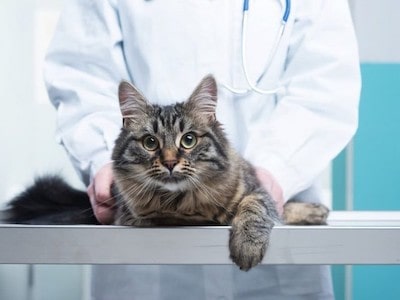
- Brush your cat regularly and remove any loose hair or mats that can cause hairballs. Give your cat hairball remedies or supplements that lubricate the digestive tract and help expel hairballs. Feed your cat hairball control diets that contain fiber and enzymes that break down hair.
- Keep your cat away from toxic plants substances or objects that can cause vomiting or poisoning. Place them out of reach or spray them with deterrents. Check your cat’s mouth regularly for any signs of injury or foreign bodies.
- Provide a calm and comfortable environment for your cat where they can feel safe and secure. Minimize stressors such as loud noises strangers other pets changes in routine household or territory. Use pheromone diffusers sprays collars toys treats that can help reduce stress and anxiety in cats.
- Consult your vet for diagnosis and treatment options if vomiting persists or worsens. Your vet may perform tests such as blood urine x-ray ultrasound endoscopy biopsy to identify the cause of vomiting and prescribe medication surgery fluid therapy dietary changes that can help treat it.
FAQ
Should I be concerned if my cat is throwing up food
While it’s reassuring that your cat is acting normal, it’s still essential to monitor their overall health. Occasional vomiting may not be cause for immediate concern, but if it becomes frequent, severe, or accompanied by other symptoms like weight loss or lethargy, it’s best to consult with a veterinarian to rule out any underlying medical conditions.
Are there any home remedies I can try to alleviate my cat’s vomiting?
While it’s always recommended to consult with a veterinarian for a proper diagnosis, there are a few home remedies you can try. These include feeding a bland diet of boiled chicken or rice, providing hairball remedies or lubricants, and ensuring your cat has a calm and stress-free environment. However, it’s crucial to seek professional veterinary advice if the vomiting persists or worsens.
Is it normal for cats to vomit hairballs?
Yes, it is relatively normal for cats to vomit hairballs occasionally. When cats groom themselves, they ingest loose hair, which can accumulate in their stomachs. As a result, they may expel hairballs through vomiting. However, if your cat is frequently vomiting hairballs or experiences difficulty in passing them, it’s advisable to consult with a veterinarian.
Can feeding my cat too quickly cause vomiting?
Yes, feeding your cat too quickly can lead to vomiting. When cats eat rapidly, they may swallow air along with their food, which can cause stomach discomfort and trigger vomiting. Using slow feeder bowls or interactive feeding toys can help slow down their eating pace and reduce the likelihood of vomiting.
Well, That’s a Wrap
Vomiting is a common problem in cats that can have many different causes. Some of them are harmless and will resolve on their own, while others are serious and require immediate veterinary attention.
To prevent vomiting in cats, you should feed them a high-quality diet, groom them regularly, keep them away from foreign objects and parasites, reduce their stress levels, and monitor their health and behavior.
If your cat is vomiting frequently or shows any signs of illness or distress, you should take them to the vet as soon as possible.
